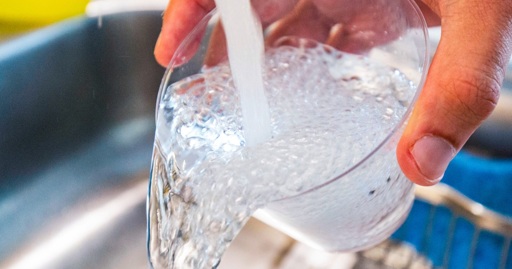A bill to ban the use of the mineral in public water passed the Florida House 88-27. It now awaits Gov. Ron DeSantis’ signature.
Lawmakers in Florida gave final passage to a bill to ban fluoride in public water systems Tuesday, with the state House voting 88-27.
SB 700, also known as the Florida Farm Bill, doesn’t mention the word “fluoride,” but it would effectively ban the chemical compound by preventing “the use of certain additives in a water system.” The bill awaits Gov. Ron DeSantis’ signature.
If DeSantis, a Republican, signs the bill, Florida will become the second state to ban fluoride from water supplies.
The three people who still have teeth in Florida are in trouble now.
9/10 Evil dentists approve
the state is named after flouride, FLOURIDA
The other state is Utah.

You’ve been Jammed!
“Sir! The radar! It appears to be - jammed!”
FYI it was a reference to parks and rec, where the local dentist (Jeremy Jamm) tried to prevent Fluorine in water so people had more cavities… because it was good for his business.
His catchphrase was “you’ve been Jammed”.
As if people’s teeth in Florida weren’t already bad enough from all the drug abuse.
meth mouth. plus meth gators.
How can the bill not say fluoride specifically but mentions “certain additives”. Surely it must list what those certain additives are? Odd.
It basically says you can’t add anything to water except for “water quality additives” and has a fuzzy definitely of water quality additive.
403.859 Prohibited acts.—The following acts and the causing thereof are prohibited and are violations of this act: (8) The use of any additive in a public water system whichdoes not meet the definition of a water quality additive as defined in s. 403.852(19)
And then 403.852(19) has
“Water quality additive” means any chemical, additive, or substance that is used in a public water system for the purpose of: (a) Meeting or surpassing primary or secondary drinking water standards; (b) Preventing, reducing, or removing contaminants; or © Improving water quality.
Bold are the additions. The “primary and secondary drinking water standards” are legally defined terms where the EPA sets limits on maximum allowable amounts of stuff in water.
https://www.epa.gov/sdwa/how-epa-regulates-drinking-water-contaminants-documents
Personally, I would argue that fluoride is added to water for the purpose of “improving water quality” because water that protects people’s teeth is higher quality than water that doesn’t. If I were someone from a municipality whose job was ensuring water quality, I would read this as still allowing the addition of fluoride. If anyone doesn’t like that, let them try to prove in a court that fluoridated water is lower quality.
let them try to prove in a court
I don’t think that would help these days
They are deporting teeth too
Yanks love to stereotype Brits as having bad teeth when statically your teeth have more cavities and removals (our dentistry focuses on health over cosmetics). Hopefully shit like this can fully kill that off that stereotype.

what ive found out when i was looking for toothpaste is how many people are obsessed with whitening thier teeth, that alot of toothpaste have it. whitening toothpaste actually damages the teeth overtime, either via through peroxides, or high abrasive toothpastes. Also if your going sls and flouride free, they also tend to have alot of whitening products in them too. and these also cause ulcers and chelitis issues.
The UK largely doesn’t fluoridate, so this is one of the (few) areas where the US actually does better than the UK. https://en.m.wikipedia.org/wiki/Water_fluoridation_by_country
The UK does generally have better tooth health in the grand scheme of things, but it’s actually pretty close, and the US is still really high on the list.
https://www.yongeeglintondental.com/blog/healthy-primary-teeth/
Without checking, I suspect the US’s slightly higher cavity rate is more down to sugar consumption than received dental care.
and also dental care isnt usually covered by most insurance so people try to ignore the problem til its too late.
“yes we offer health insurance but fuck your teeth and eyes you poor fuck”
That’s only because we have states like Alabama skewing our statistics
It’s also a diet thing and a result of people damaging their teeth with whitening and cheap veneers.
The majority of people I know with dental issues couldn’t afford to have minor things fixed so they turned into major things.
Dental insurance is a joke and lots of people don’t even get that joke.
i had to wait 10years befor going to the dentist, because it was mostly unaffordable, one of my bros went to a dentist who dint take insurance but they charged hundreds per (whatever they were doing for the teeth), ultimately resulting in an abscess /root canal and then a very expensive implant.
the dentist reasoning is because insurance dont fully reimburse for the cost of the procedures, plus its a hassle to deal with in general.
No it’s because your bread has so much sugar the rest of the world would call it cake.
Leave Florida if you can. Especially if you have or are expecting children. Moving isn’t always possible, but if you live in Florida know that your state is actively trying to hurt you.
You know who doesn’t need Fluoride in their drinking water? People with dentures.
Checkmate whipper snappers.
I feel so bad for anyone who lives there through no choice of their own
You don’t need municipal water to be fluoridated if you just want your kids to have fluoridation. When I was a kid, we didn’t have fluoridation available in our municipal water, and so my folks got themselves a water cooler and ordered delivery of five gallon bottles of fluoridated water for it. Mom made a point of making milk with it from powdered milk so that everyone got their fluoridation. You can still get those bottles.
I mean, I’m sure that the great bulk of people aren’t going to do that, and that it’s going to lead to dental problems down the line, but it’s not like an individual can’t get ahold of the water if they want it. Costs more per unit of water volume to have it delivered than to pipe it in, but then, you’re not drinking all that much volume of water, either; most residential water use goes to things other than drinking.
EDIT: Plus, if you have a water cooler, you also can have chilled water. We didn’t have a powered cooler; ours was just an unpowered, gravity-fed dispenser, but all of the modern-day ones I’ve run into in offices have a chiller.
https://www.amazon.com/s?k=water+dispenser+cooler
If I lived in (tropical) Florida, I’d probably want to have chilled water handy…
Yet another expense lumped onto American citizens that is entirely avoidable
Not to mention infeasible for people already struggling to afford food and other basic necessities. Which means they will struggle to afford the dental care from not being able to afford privatized fluoride.
Its all a trap to push people in poverty into deeper states of vulnerability, eventually prison, and therefore free labor for the state
Isn’t it great that our teeth aren’t part of our health insurance?
You’re kinda missing the point. It doesn’t stop at flouride. It doesn’t stop at deregulating manufacturing waste. Nothing in politics is “just one thing” it’s either an up or down trend that continues until people force change.
Being able to circumvent their measures doesn’t mean they aren’t actively trying to increase harms for residents.
You don’t leave Florida because you want flouride in your water. You leave Florida because it’s the type of state that would ban flouride in the water.
Done even need that.
I went to a rural school and every week on Tuesdays we took 10 minute shifts to go rinse our mouths with a fluoride mouth wash. 1 gallon jug with a pump and Dixie cups. Lasted most of a school year.
Fluorida
Ban chlorine and chloramine in the water too! The microorganisms will strengthen your immune system. Just like Haiti. :)
Removed by mod
a substance as dangerous as chlorine
Water is often said to be the “element of life”, and we need oxygen to live. But if you add one oxygen atom to a water molecule you end up with H2O2, or hydrogen peroxide, which is deadly.
This is the thing that the majority of people don’t understand about chemistry. Just because one chemical (water is a chemical, btw) has the same word in its name as another chemical that’s known to be highly toxic doesn’t mean they’re both toxic.
Chemistry is insanely complex and we are entirely unable to evaluate the toxicity of a chemical just by its name (without prior knowledge).
Removed by mod
Maybe do like 5 min of research to learn how the treatment works and why it’s completely safe?
You literally just proved my point. Congrats.
Man, just wait until you hear about this awful chemical called dihydrogen monoxide. It’s used as an industrial solvent, cleaning agent, and all other kinds of destructive things, and they put it in your food! This shit can kill you if you breathe in too much, yet they put it in our food?!?!1?1
Is your argument that chlorine is as safe to consume as water?
No, just that your dAnGeRoUs ChEmIcAl assertion is FUD and spreading ignorance. But considering you ‘unironically yes’-ed a comment referencing Haiti and how the microorganisms will strengthen your immune system, I’m entirely unsurprised.
As another person put it ‘the dose is the poison’. Sure, chlorine is poisonous in large doses. But so is water.
Removed by mod
If I had to choose between panicking over chlorinated water or spending billions of dollars to disinfect water in a less effective way…
I’d probably just let the water sit out for a while or run it through a cheap carbon filter because I’m not an idiot.
You think chlorine is mostly known for being used as a chemical weapon? Not, you know… Swimming pools?
You’re a good example of why people make bad choices about science related public policy.
First, the poison is in the dose. There’s a big difference between inhaling concentrated chlorine gas and drinking trace quantities.
Second, how do you propose we uv sterilize the water? We’d need to do so at the plant, but also at any holding cisterns. Or were you thinking of retrofit for houses? And not all microorganisms are strongly impacted by UV. It’s tricky to find legitimate research, since the people who sell them say they work great, but what’s out there paints a different picture of efficacy.Removed by mod
Nope, they don’t treat the cisterns because the water has been treated at the conditioning plant. Part of the reason for treatment is because holding reservoirs pose a significant risk for contamination.
In my municipality there aren’t enough cisterns that there’s a significant risk of undetected damage, but larger cities, particularly with tall buildings, will have enough that contamination is able to go longer without detection. It’s why major cities treat their water more aggressively.Salt is poison. It’s also a disinfectant antimicrobial. You also die unless you get a quantity of it.
Ethanol is a disinfectant poison, and so is lye/sodium hydroxide. Having a pretzel and a beer every now and then is also harmless, despite being cooked in disinfectant, topped with disinfectant, and washed down with yet another disinfectant.You die unless you get enough water, and you die if you get too much.
Foxglove can kill you, or correct dangerous heart conditions.
Apples contain trace amounts of cyanide. Pears have formaldehyde in them because it’s part of natural biological processes. (Your body actually has special processes for handling the formaldehyde it produces. You still shouldn’t drink it, but pears are fine)The dose makes the poison. That’s not just a phrase meaning that sometimes you can avoid toxicity, it’s quite literal. A poison is a chemical that disrupts normal bodily processes. Every chemical can do that with the correct (incorrect?) concentration.
If you choose to point to a chemical and say it shouldn’t be consumed because there’s a dose that can be harmful, it’s worth remembering that every substance has that limit.that doesn’t mean chemical build up or other toxicity related illnesses cannot occur
And that’s the type of question you need to ask, not “is it poisonous at some dosage”. You might be shocked to learn that that’s actually part of what we look at when deciding if a chemical is safe to use in some context.
Also, I don’t drink the pool water because it’s a taboo in my culture to drink water that has had people in it. Doesn’t mean it’s unsafe to drink, since getting some in your mouth is inevitable when swimming. It’s treated much more aggressively because “people are in it” and communal things like that are risks for disease spread.
Kinda like why I don’t sterilize my scissors at home, but my barber does. The public health aspect is why they need a license and training that covers sanitation and the basics of skin diseases.
Also, the pool inevitably has pee in it. at a significantly higher concentration than the chlorine in drinking water, as an aside.Removed by mod
I don’t know what to say other than, maybe, poison is poison.
I feel like I was pretty resoundingly disputing that bit, because it’s not a true statement. Concentration matters. A substance not being readily eliminated from the body is just one way for a concentration to become high enough to do harm.
Yes. Sometimes science misses an outcome. It’s entirely about balancing risks with benefits. The risk of chlorine as a water additive is low, because we’ve studied it, there’s no theoretical mechanism, and it’s been in use for several generations with no ill effects. The benefits are cost effective clean drinking water.
There is nothing inaccurate about stating poison is poison. You’re arguing the poison will not have an effect. That does not mean anything about its chemical structure or toxic properties have changed.
There is a reason the LD50 is listed. It shows a what concentration will kill a species of animal, usually mice. This is not entire analogous to humans but we accept this is the only practice that is maybe acceptable.
We do not test on humans and there is no blind study to show there are no longterm effects of consuming trace amounts of chlorine in water.
I already edited it to infamously anyways thats what comes to my mind at first when i think of chlorine.
And how would i propose we do this? By living in a country that already does it. Here is the page of my local water provider:
https://www.evides.nl/uw-drinkwater/productieproces/de-zuiveringsprocessen
Daarna maken we het water bacteriologisch betrouwbaar: de hoofddesinfectie. Dit gebeurt door middel van ultraviolet licht (UV).
Then we make the water bacteriologically reliable: the main disinfection. This is done by means of ultraviolet light (UV).
So on whatever way the Netherlands does it seems to work out.
Being used to this type of water when i go on vacation it really smells like im drinking swimming pool water.
Didn’t know anyone was doing it at scale. Neat.
In any case, retrofitting most municipal systems just to protect against a non-existent danger just isn’t feasible.
Looking a bit more into the process in the Netherlands, it looks like it’s not just UV light. It looks like it’s also aggressive filtration, and treatment with lye and hydrogen peroxide. Also benign, but not quite in line with the “nothing that seems toxic in the water” story.
The Netherlands also chlorinates water, just not to the degree some other countries do. The chlorine is what keeps the water safe during transport and storage after it has been sterilized.
Ban sodium chloride too!
Is your argument that chlorine is as safe to consume as salt?
Are you claiming that chlorinated water is as dangerous as chlorine gas?
No, but i am saying i would rather not drink disinfectants.
Then enjoy waterborne diseases - apparently that’s preferable to chlorine concentrations of, at most, 4 parts per million.
when UV sterilization exists and is proven.
And costs orders of magnitude more.
Using chlorine to treat drinking water is fine dude, just stop.
Does your tap have a UV light in it, or do you think there’s no possibility of bacterial growth between the water processing plant and your house?
Stop being so negative. They’ve clearly given this a lot of thought. At least two to three seconds.
Yes it does

So then why do you care?
And how much did it cost?
mustard gas is not the same as chlorinated water, or even bleach and ammonia. its a different compound.
Chlorine gas was actually used in world war 1. It’s still a massive stretch to invoke that in relation to water treatment.
It’s like invoking water boarding to say we shouldn’t have a water supply.
I was not talking about Mustard gas but chlorine gas, according to wikipedia first deployed on masse during tbe Second battle of Ypres by the germans.
What a stupid and shitty timeline we’re living in. Holy shit.
Florida was always stupid. Anything they do, will not surprise me.
When are they going to ban dihydrogen monoxide?
More like DEI Hydrogen Monoxide
You’ve just doomed us all.
They probably should in some parts of the U.S. right? It’s that badly contaminated.
Bring back asbestos, Florida! And leaded gasoline!
And gas station bath salts!












